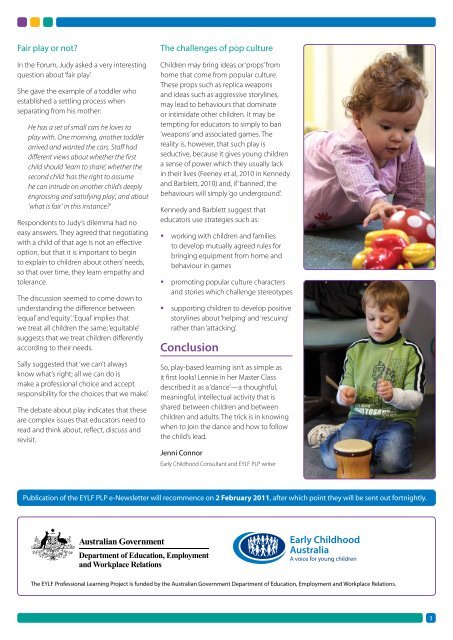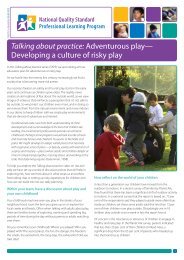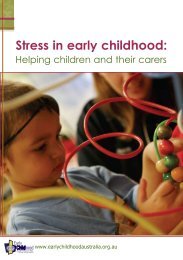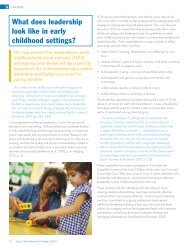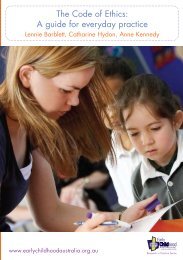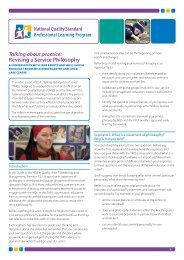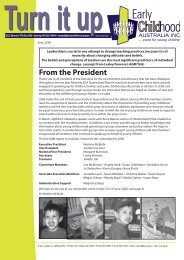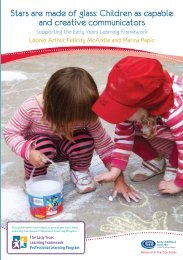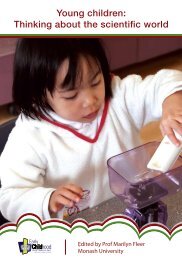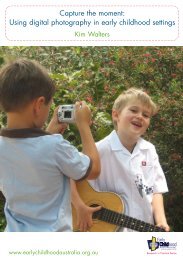Thinking about play - Early Childhood Australia
Thinking about play - Early Childhood Australia
Thinking about play - Early Childhood Australia
Create successful ePaper yourself
Turn your PDF publications into a flip-book with our unique Google optimized e-Paper software.
Fair <strong>play</strong> or not?<br />
In the Forum, Judy asked a very interesting<br />
question <strong>about</strong> ‘fair <strong>play</strong>’.<br />
She gave the example of a toddler who<br />
established a settling process when<br />
separating from his mother:<br />
He has a set of small cars he loves to<br />
<strong>play</strong> with. One morning, another toddler<br />
arrived and wanted the cars. Staff had<br />
different views <strong>about</strong> whether the first<br />
child should ‘learn to share’, whether the<br />
second child ‘has the right to assume<br />
he can intrude on another child’s deeply<br />
engrossing and satisfying <strong>play</strong>’, and <strong>about</strong><br />
‘what is fair’ in this instance?’<br />
Respondents to Judy’s dilemma had no<br />
easy answers. They agreed that negotiating<br />
with a child of that age is not an effective<br />
option, but that it is important to begin<br />
to explain to children <strong>about</strong> others’ needs,<br />
so that over time, they learn empathy and<br />
tolerance.<br />
The discussion seemed to come down to<br />
understanding the difference between<br />
‘equal’ and ‘equity’. ‘Equal’ implies that<br />
we treat all children the same; ‘equitable’<br />
suggests that we treat children differently<br />
according to their needs.<br />
Sally suggested that ‘we can’t always<br />
know what’s right; all we can do is<br />
make a professional choice and accept<br />
responsibility for the choices that we make’.<br />
The debate <strong>about</strong> <strong>play</strong> indicates that these<br />
are complex issues that educators need to<br />
read and think <strong>about</strong>, reflect, discuss and<br />
revisit.<br />
The challenges of pop culture<br />
Children may bring ideas or ‘props’ from<br />
home that come from popular culture.<br />
These props such as replica weapons<br />
and ideas such as aggressive storylines,<br />
may lead to behaviours that dominate<br />
or intimidate other children. It may be<br />
tempting for educators to simply to ban<br />
‘weapons’ and associated games. The<br />
reality is, however, that such <strong>play</strong> is<br />
seductive, because it gives young children<br />
a sense of power which they usually lack<br />
in their lives (Feeney et al, 2010 in Kennedy<br />
and Barblett, 2010) and, if ‘banned’, the<br />
behaviours will simply ‘go underground’.<br />
Kennedy and Barblett suggest that<br />
educators use strategies such as:<br />
working with children and families<br />
to develop mutually agreed rules for<br />
bringing equipment from home and<br />
behaviour in games<br />
promoting popular culture characters<br />
and stories which challenge stereotypes<br />
supporting children to develop positive<br />
storylines <strong>about</strong> ‘helping’ and ‘rescuing’<br />
rather than ‘attacking’.<br />
Conclusion<br />
So, <strong>play</strong>-based learning isn’t as simple as<br />
it first looks! Lennie in her Master Class<br />
described it as a ‘dance’—a thoughtful,<br />
meaningful, intellectual activity that is<br />
shared between children and between<br />
children and adults. The trick is in knowing<br />
when to join the dance and how to follow<br />
the child’s lead.<br />
Jenni Connor<br />
<strong>Early</strong> <strong>Childhood</strong> Consultant and EYLF PLP writer<br />
Publication of the EYLF PLP e-Newsletter will recommence on 2 February 2011, after which point they will be sent out fortnightly.<br />
The EYLF Professional Learning Project is funded by the <strong>Australia</strong>n Government Department of Education, Employment and Workplace Relations.<br />
3


